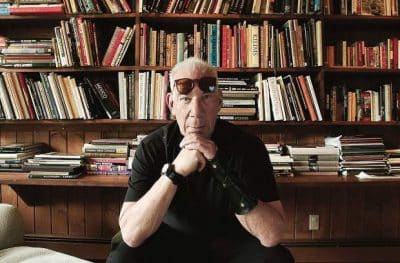
Aspen Film to pay tribute to cinema pioneer Bob Rafelson
September 23, 2022

The transformative filmmaker Bob Rafelson’s storied career took him all over the globe, but his Castle Creek residence and Aspen were his home base for more than 40 years.
So it’s no wonder Aspen Film and Rafelson had a connection until he died from lung cancer July 23 at his home at age 89.
The organization will pay tribute to Rafelson with a free screening of his 1981 remake of “The Postman Always Rings Twice” at 8 p.m. Thursday, Sept. 29, at the Wheeler Opera House. The tribute is part of the 43rd annual Filmfest staged by Aspen Film.
“I wanted the screening of ‘Postman’ to be free as a way of saying thanks to all those who interacted with Bob at the local markets, restaurants, pharmacy, library and shops,” said his widow, Gabrielle Rafelson, in an email. “They are the people that made this town into a home for Bob.”
Rafelson’s remake of the 1946 “The Postman Always Rings Twice,” an adaption of James M. Cain’s 1934 hardboiled crime novel, starred Jessica Lange and Jack Nicholson, who used to live part time in Aspen. “Postman” met mixed reviews and much pearl-clutching over its steamy sex scenes with Lange and Nicholson, after its 1981 release. The film was shot in Santa Barbara, California.
“Bob was pleased with ‘Postman,’ stylistically as well as with the great performances he pulled out of Jack and Jessica,” Mrs. Rafelson said. “He worked hard on that film. At one point he sat for a 24-hour period at the spot near the gas station/restaurant in order to keep meticulous track of where the sunbeams and moonbeams would hit and at what time so he could plan the shots accordingly. I also think it toiled with themes Bob investigated in most of his films — like the complexities of love, and how dark and tender it can feel at the same moment.
“Bob did not like to watch his films again once they were finished, but I can tell you I think he would’ve thought it stood the test of time, except maybe that it was 10 minutes too long.”
Rafelson’s some 40-year relationship with Aspen Film started when he was introduced to its founder, Ellen Kohner Hunt. Their meeting “sparked a long-lasting friendship,” Mrs. Rafelson said.
“Bob was on their advisory committee for many years, and both Ellen and Laura Theilen (former executive director) consulted with him on festival issues even though he tried to keep his Hollywood persona out of Aspen,” Mrs. Rafelson said.
Aspen Film honored Rafelson with its Independent by Nature award in 1999 and a Lifetime Achievement Award in 2019, the 40-year anniversary of the nonprofit organization. Mrs. Rafelson went into labor the same evening her husband was receiving the Independent by Nature award.
“It took Aspen Film several years of convincing before Bob allowed them to honor him with their first Independent by Nature award in ’99, which happened to be the same night I went into labor with our first son, EO,” she said. “Bob’s high regard for what Aspen Film was doing and how it contributed to this community continued with Susan Wrubel’s appointment as executive director. Bob was a great proponent of independent films and felt Aspen Film helped to bring those kinds of movies here to a wider audience.”
Wrubel became was named executive director of Aspen Film in September 2017.
Rafelson’s body of work in the roles of director, screenwriter and producer, or all three at once, includes “Easy Rider” from 1969, “Five Easy Pieces” from 1970, “The Last Picture Show” from 1971 and “The King of Marvin Gardens” from 1972. He also made movies in the ’80s, ’90s and into 2002, and helped create “The Monkees” sitcom that ran for two seasons on NBC in the late 1960s. He made six movies with Nicholson, and he was considered a pioneer in the New Hollywood movement.
“Rafelson helped transform American independent cinema with his style and approach to filmmaking,” Aspen Film’s website said after his death, noting that “Bob truly exemplified Aspen Film’s ‘Independent by Nature’ motto. Keeping the Isis Theatre open in Aspen as a place to foster that spirit for this community was also very important to Bob. Bob, you and your work will never be forgotten — thank you for being such a friend to and supporter of Aspen Film and to this community. Your contributions are immeasurable.”
Rafelson also would speak up when he saw things happening in Aspen he didn’t like.
“Bob fell in love with Aspen the moment he arrived in the ’60s for the obvious reasons — he was an avid hiker, dedicated cross-country skier, and appreciated the amount of arts and culture this small town offered,” Mrs. Rafelson said. “But he was not one to sit silently, ever, if something irked him. He cared when the lights were left on in empty buildings because it distracted from the beauty of the nighttime sky. He worried about the noise and overpopulation that giant jets might bring to this valley. What pushed his buttons you ask? Actions without deep consideration to its adverse effects on the extraordinary nature of this place.”
Read the full story HERE.